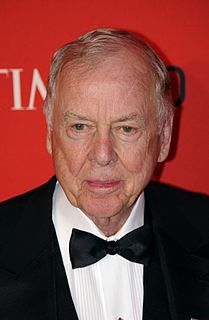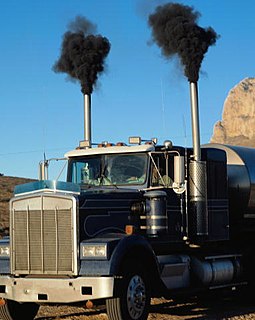
The Energy Policy Act of 2005 is a bill passed by the United States Congress on July 29, 2005, and signed into law by President George W. Bush on August 8, 2005, at Sandia National Laboratories in Albuquerque, New Mexico. The act, described by proponents as an attempt to combat growing energy problems, changed US energy policy by providing tax incentives and loan guarantees for energy production of various types.
The United States produces mainly biodiesel and ethanol fuel, which uses corn as the main feedstock. In 2005 the US overtook Brazil as the world's largest ethanol producer. In 2006 the US produced 4.855 billion US gallons of ethanol. The United States, together with Brazil accounted for 70 percent of all ethanol production, with total world production of 13.5 billion US gallons. When accounting just for fuel ethanol production in 2007, the U.S. and Brazil are responsible for 88% of the 13.1 billion US gallons total world production. Biodiesel is commercially available in most oilseed-producing states. As of 2005, it was somewhat more expensive than fossil diesel, though it is still commonly produced in relatively small quantities. Due to increasing pollution control and climate change requirements and tax relief, the U.S. market is expected to grow to 1 to 2 billion US gallons by 2010.

California Proposition 87 was a proposition on the ballot for California voters for the November 7, 2006 general election, officially titled Alternative Energy. Research, Production, Incentives. Tax on California Oil Producers. It was rejected by the voters, 54.7% opposed to 45.3% in favor. This was highest-funded campaign on any state ballot and surpassing every campaign in the country in spending except the presidential contest.

The Energy Independence and Security Act of 2007 is an Act of Congress concerning the energy policy of the United States. As part of the Democratic Party's 100-Hour Plan during the 110th Congress, it was introduced in the United States House of Representatives by Representative Nick Rahall of West Virginia, along with 198 cosponsors. Despite Rahall becoming 1 of only 4 Democrats to oppose the final bill, it passed in the House without amendment in January 2007. When the Act was introduced in the Senate in June 2007, it was combined with Senate Bill S. 1419: Renewable Fuels, Consumer Protection, and Energy Efficiency Act of 2007. This amended version passed the Senate on June 21, 2007. After further amendments and negotiation between the House and Senate, a revised bill passed both houses on December 18, 2007 and President Bush, a Republican, signed it into law on December 19, 2007, in response to his "Twenty in Ten" challenge to reduce gasoline consumption by 20% in 10 years.

According to the U.S. Energy Information Industry (EIA), the United States produced 5.14 billion metric tonnes of carbon-dioxide equivalent greenhouse gas (GHG) emissions in 2017, the lowest since the early 1990s. From year to year, emissions rise and fall due to changes in the economy, the price of fuel and other factors. The US Environmental Protection Agency attributed recent decreases to a reduction in emissions from fossil fuel combustion, which was a result of multiple factors including switching from coal to natural gas consumption in the electric power sector; warmer winter conditions that reduced demand for heating fuel in the residential and commercial sectors; and a slight decrease in electricity demand.

Renewable energy accounted for 12.2 % of total primary energy consumption and 14.94 % of the domestically produced electricity in the United States in 2016. Hydroelectric power is currently the largest producer of renewable electricity in the country, generating around 6.5% of the nation's total electricity in 2016 as well as 45.71% of the total renewable electricity generation. The United States is the fourth largest producer of hydroelectricity in the world after China, Canada and Brazil.

Clean Cities is a government-industry partnership in the United States that provides regional coalitions with information and incentives from the United States Department of Energy (USDOE), a large collection of technical data and resources, and coordinated strategies and resources they can leverage to obtain maximum petroleum reduction. The Clean Cities partnership consists of 87 coalitions that work with 5,700 local stakeholder programs that have helped avoid the usage of over 2 billion US gallons (7,600,000 m3) of petroleum, put more than 500,000 AFVs on the road, and played a role in the construction of over 3,000 alternative refueling stations since 1993.

The California state elections, November 2008 were held on November 4, 2008 throughout California. Among the elections taking place were those for the office of President of the United States, all the seats of California's delegation to the House of Representatives, all of the seats of the State Assembly, and all of the odd-numbered seats of the State Senate. Twelve propositions also appeared on the ballot. Numerous local elections also took place throughout the state.

The Pickens Plan is an energy policy proposal announced July 8, 2008, by American businessman T. Boone Pickens. Pickens wants to reduce American dependence on imported oil by investing approximately $US1 trillion in new wind turbine farms for power generation, which he believes would allow the natural gas currently used for power generation to be shifted to fuel CNG trucks and other heavy vehicles. Pickens stated that his plan could reduce by $300 billion (43%) the amount the country spends annually on foreign oil.
Pennsylvania approved a bill that establishes a $500 million fund to support renewable energy projects. Special Session House Bill 1 authorizes the Commonwealth Financing Authority to borrow $500 million, most of which will be split into six funding sources relating to energy efficiency and renewable energy: $80 million in grants and loans for solar energy projects; $100 million in grants, loans, and rebates for up to 35% of the cost of solar energy projects at residences and small businesses; $165 million in grants and loans for alternative energy projects, excluding solar energy, at businesses and local government facilities; $25 million for wind and geothermal energy projects; $40 million to help start-up businesses involved in energy efficiency technologies; and $25 million in grants and loans to improve the energy efficiency of new and existing homes and small business buildings. An additional $65 million will go toward pollution control technologies and to help low-income families pay their energy bills.
The environmental impact of transport in Australia is considerable. Australia subsidizes fossil fuel energy, keeping prices artificially low and raising greenhouse gas emissions due to the increased use of fossil fuels as a result of the subsidies. The Australian Energy Regulator and state agencies such as the New South Wales' Independent Pricing and Regulatory Tribunal set and regulate electricity prices, thereby lowering production and consumer cost.

California Proposition 7, would have required California utilities to procure half of their power from renewable resources by 2025. In order to make that goal, levels of production of solar, wind and other renewable energy resources would more than quadruple from their current output of 10.9%. It would also require California utilities to increase their purchase of electricity generated from renewable resources by 2% annually to meet Renewable Portfolio Standard (RPS) requirements of 40% in 2020 and 50% in 2025. Current law AB32 requires an RPS of 20% by 2010.

Proposition 23 was a California ballot proposition that was on the November 2, 2010 California statewide ballot. It was defeated by California voters during the statewide election by a 23% margin. If passed, it would have suspended AB 32, a law enacted in 2006, legally referred to its long name, the Global Warming Solutions Act of 2006. Sponsors of the initiative referred to their measure as the California Jobs Initiative while opponents called it the Dirty Energy Prop.
United States policy in regard to biofuels, such as ethanol fuel and biodiesel, began in the early 1990s as the government began looking more intensely at biofuels as a way to reduce dependence on foreign oil and increase the nation's overall sustainability. Since then, biofuel policies have been refined, focused on getting the most efficient fuels commercially available, creating fuels that can compete with petroleum-based fuels, and ensuring that the agricultural industry can support and sustain the use of biofuels.

The principle of a fuel cell was discovered by Christian Friedrich Schönbein in 1838, and the first fuel cell was constructed by Sir William Robert Grove in 1839. The fuel cells made at this time were most similar to today's phosphoric acid fuel cells. Most hydrogen fuel cells today are of the proton exchange membrane (PEM) type. A PEM converts the chemical energy released during the electrochemical reaction of hydrogen and oxygen into electrical energy. The Energy Policy Act of 1992 was the first national legislation that called for large-scale hydrogen research. A five-year program was conducted that investigated the production of hydrogen from renewable energy sources and the feasibility of existing natural gas pipelines to carry hydrogen. It also called for the research into hydrogen storage systems for electric vehicles and the development of fuel cells suitable to power an electric motor vehicle.

Proposition 39 is a ballot initiative in the state of California that modifies the way out-of-state corporations calculate their income tax burdens. The proposition was approved by voters in the November 6 general election, with 61.1% voting in favor of it.

California Proposition 6 was a measure that was submitted to California voters as part of the November 2018 election. The ballot measure proposed a repeal of the Road Repair and Accountability Act, which is also known as Senate Bill 1. The measure failed with about 57% of the voters against and 43% in favor.
California has taken legislative steps in the hope of mitigating the risks of potential effects of climate change in California by incentives and plans for clean cars, renewable energy, and pollution controls on industry.
















